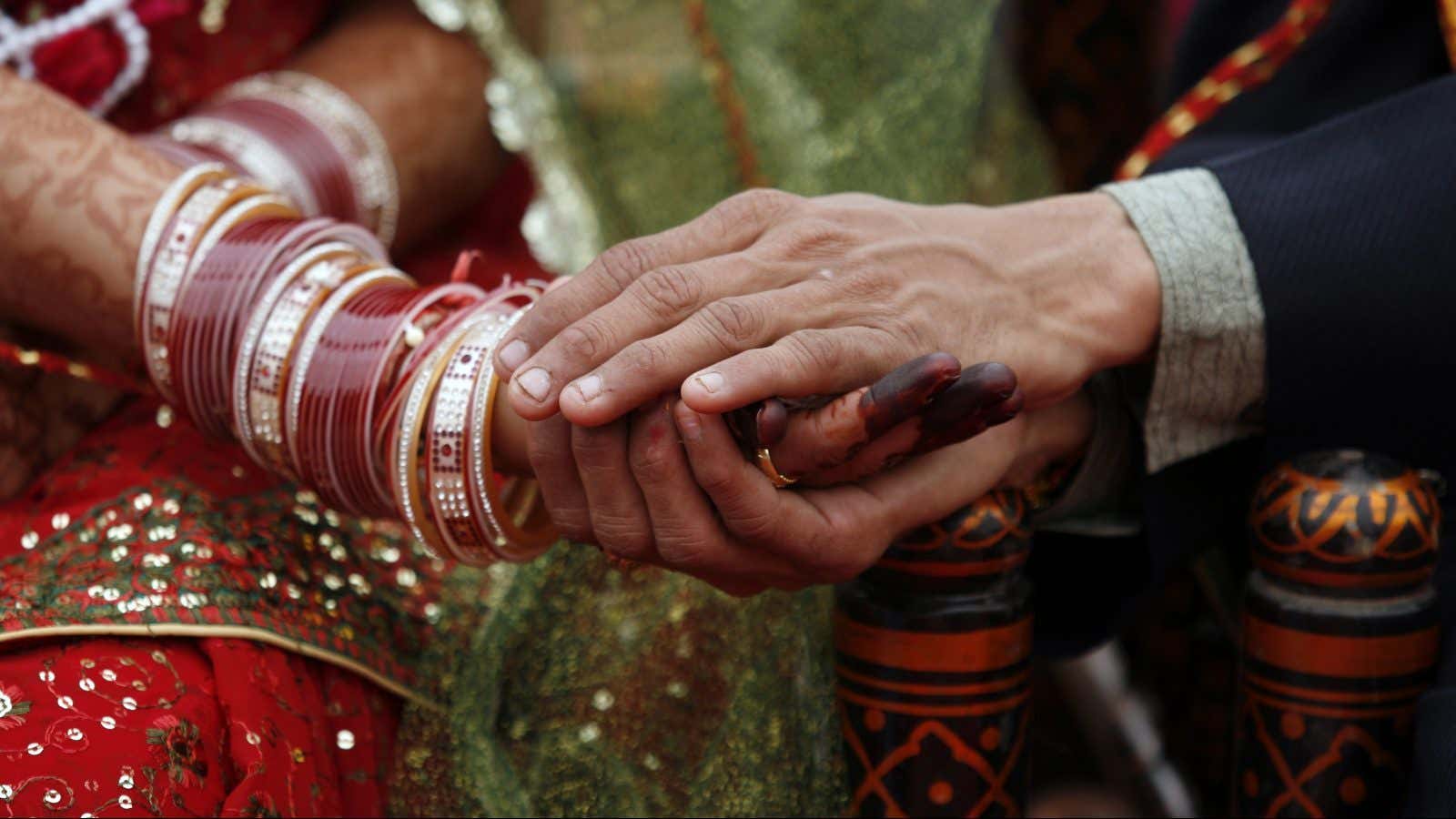Dating apps like Tinder and Woo may be trendy, but when it gets serious, it is India’s matrimonial websites that still rule the roost.
As a testament to that, one of India’s oldest matchmaking portals is all set to launch its initial public offering (IPO) on Indian bourses today (Sept. 11). The 17-year-old Matrimony.com, which operates websites such as BharatMatrimony.com, CommunityMatrimony.com, and EliteMatrimony.com, is looking to raise Rs500 crore ($78.3 million). These proceeds will be used to repay bank overdrafts, buy land to build a new office in Chennai, and help strengthen its presence in the $40 billion to 50 billion Indian wedding market (paywall).
Chennai-based Matrimony.com is the country’s largest matchmaking company by number of visitors, according to media analytics firm comScore. It caters to over 3.2 million users across its network of over 300 websites. This is the company’s second attempt at going public, after it scrapped its earlier plans in December 2016, citing unfavourable market conditions. Coming over a year after e-commerce firm Infibeam’s April 2016 outing, Matrimony.com’s IPO would be among the few by Indian internet firms.
And while dating apps are gaining traction, Matrimony.com’s founder and CEO Murugavel Janakiraman believes arranged marriages are still the norm, meaning there’s still room for his business to grow, especially as internet access expands.
“India is a strong matrimony market,” Janakiraman said, adding that new-age dating apps are likely to struggle to make substantial profits, given that it’s not easy to get women to use them. Matrimony.com, on the other hand, is among the handful of profitable Indian web ventures.
The serendipitous beginning
The idea for Matrimony.com emerged in the 1990s, when Janakiraman was working with AT&T-Lucent in the US. He had set up a community website to connect with other Indians, and noticed that it was the matrimony section that attracted the most traffic. So, in 2000, he decided to turn this into a bigger business, and returned to Chennai to launch Matrimony.com.
For decades, Indian arranged marriages have mainly been organised through classified advertisements, offline marriage bureaus and brokers, or word-of-mouth referrals of family and friends. The first online matchmaking portal, Shaadi.com, was established in 1996, marking a new era for the business.
To set his company apart, Janakiraman decided to focus on making it easy for users to search for partners from a wide range of religions, castes, languages, and other categories. He began with Tamilmatrimony.com and Telugumatrimony.com, and gradually expanded into over 300 specialised portals, including ones for divorced people, mangliks (people with a certain astrological condition that is believed to be unfavourable for marriage), doctors, and defence personnel. It also runs a portal for wealthy Indians called Elitematrimony.com, besides separate websites for Arabs, Sri Lankans, Bangladeshis, and Pakistanis.
Now, Janakiraman said, online matchmaking portals account for around 10% of the market in India. And while competitors, including Shaadi.com and Jeevansaathi.com (launched in 2004), also provide community-based searches, they don’t match Matrimony.com’s range.
“We have been tracking data since 2006, and since then, we have had 26 million users of our sites,” Janakiraman said. Bharatmatrimony.com’s mobile app, launched in 2011, has had five million downloads.
Matrimony.com saw a 22% increase in the number of profiles listed on its website last year, and Janikaraman expects this number to surge as internet access becomes more affordable. It makes money largely through subscriptions—you can create a profile on the site for free but need to be a paid member to contact someone you are interested in. Membership for Bharatmatrimony costs Rs4,200 for three months, while that on EliteMatrimony costs Rs50,000 for the same period and goes up to Rs10 lakh for two years.
Last year, Matrimony.com earned Rs292 crore in revenue and made a profit of Rs44 crore, Janakiraman told Quartz. It has so far raised Rs99 crore from Bessemer Venture Partners, Mayfield, and JP Morgan Asset Management. These venture capital investors will sell some of their stakes through the IPO, the company said in its red herring prospectus.
Now, Matrimony.com is hoping to go beyond matchmaking, leveraging its brand to offer wedding-related services, too.
Earlier this year, it began offering services like wedding photography, videography, and catering in Tamil Nadu, and plans to launch the same in other states once the model is perfected, Janakiraman said.
But the company’s previous attempt at diversification didn’t go so well. In 2012, Matrimony.com launched Tambulya, an online return-gift store, but failing to turn profitable and running into regulatory issues, it shut shop. Janakiraman’s dating app, Matchify, didn’t have many takers either and was discontinued within a year of its launch in 2015.
